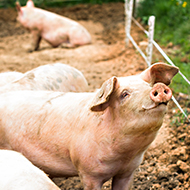Government steps up campaign to tackle African swine fever

The risk of ASF infection in the UK is currently considered to be low.
The UK government has launched a survey aimed at small-scale pig keepers, including smallholders, pet pig keepers and hobbyists, on African swine fever (ASF).
It forms part of a campaign to tackle the introduction and spread of ASF, which has devastated pig populations across much of China and has recently been circulating in parts of Europe.
The survey seeks to find out what small-scale pig keepers already know about the disease, identify their feeding and biosecurity practices, and discover what sources they refer to for guidance on keeping pigs.
Findings will be used to improve the information available to pig keepers to help protect the health of their pigs and the UK pig industry.
UK Chief Veterinary Officer Christine Middlemiss commented: “African swine fever has no cure and there are currently no effective vaccines. If it were to reach the UK, it would have a devastating impact on commercial pig keepers, small-scale pig keepers and pet pig keepers alike. Everyone who keeps pigs can take actions to contribute to keeping African swine fever out of the UK.
“If you are a small-scale pig keeper or keep pigs as pets, please complete the survey to help governments across the UK understand more about your knowledge of the disease and your pig keeping practices. This will help us to provide you with the information you need to protect the health of your pigs and all UK pigs.”
ASF is a notifiable disease of pigs that has caused serious production and economic loss across the globe. It is highly contagious and can result in death for almost all pigs that are infected.
In the UK, the risk of infection is currently considered to be low but is highly dependent on the level of biosecurity on individual pig premises.
The survey can be found here and closes on 31 August 2020.



 The Veterinary Medicines Directorate (VMD) is inviting applications from veterinary students to attend a one-week extramural studies (EMS) placement in July 2026.
The Veterinary Medicines Directorate (VMD) is inviting applications from veterinary students to attend a one-week extramural studies (EMS) placement in July 2026.